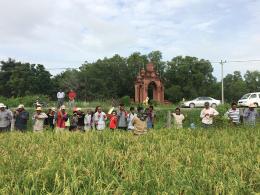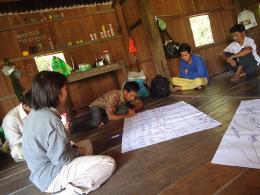Promotion Of Electric Motorbike Adaptation for a Sustainable Transport Sector
Background
Mobility is part of everyday life; thus, it plays a critical role in the development of a society. Like in many developing countries, motor vehicles are a convenient and popular mode of transportation for growing cities in Cambodia. However, motor vehicles produce negative externalities such as air pollution and increased greenhouse gas (GHG) emissions. Transportation is one of the key sectors contributing to GHG emissions in Cambodia. Based on the latest Biennial update report (2020), transport emitted over 5 million tons of Co2eq. in 2016, which is more than double the amount in 2005. It represents 3.1% of the total emissions in Cambodia. Transport is a major sub-sector of emissions in energy sector, contributing almost two- thirds of carbon dioxide (CO2) emissions and half of nitrogen oxide emissions.
The transport sector is perceived as not only a vulnerable sector to climate change through extreme climate events to damage the infrastructure, but a contributing sector to climate change through greenhouse gases (GHG) emission from
transportation. The project is expected to benefit government officials from MPWT, General Department of Planning and Policy and General Department of Land Transport, Ministry of Environment (MoE), and other relevant officers through capacity building in addressing climate change issues, and as a result, this will be advantage for Cambodian citizens as a whole.
Overall Objective
The proposed project aims to remove some key barriers to the scaling-up of two-wheel electric motorbikes in Cambodia, including regulatory and awareness barriers
Specific Objectives
1. Seeks to promote EV adoption through a mix of policy measures;
2. Enhance capacity development for concerned officials; and
3. Demonstrate and increase exposure to two-wheel electric vehicles fleets in the public and private sector.
Approach
The project will be implemented through three inter-related components as below:
1. Development of priority regulations to facilitate adoption of electric motorbikes;
2. Strengthening institutional capacities and public awareness on the use of electric motorbikes; and
3. Demonstration of existing technologies through early adopters.
The first component supports focus on identifying and developing the most urgent regulations to support large-scale deployment of electric motorbikes that ensures quality, safety and sustainability (include safety requirements, technical specifications, standards for battery, charging stations, battery reuse/recycling/disposal, restrictions on import of second-hand e-motorbikes etc.) through assessment and consultations with concerned public and private stakeholders.
The second component centers on promoting knowledge about electric motorbikes, addressing key gaps through building capacity of relevant actors, carrying out activities for awareness, disseminating the benefits of this technology to the public. The campaign in social media will be included the demonstration center/points at public events for a test drive of electric motorbikes.
The last component will demonstrate application of the e-motorbikes, through adoption by public and private fleets for the Cambodian market. E-bikes will be procured for a public fleet to increase visibility and knowledge of the technology, and feedback of e-bike adoption shall be shared. It also examines suitable economic incentive for private sector to renew/ introduce e-bikes in the market.
Outputs and Key Activities
| Result | Key Activities |
|---|---|
|
|
Knowledge Products
- International comparative analysis of regulatory frameworks for electric motorbikes / vehicles, and recom- mendations for Cambodia; - Generation and analysis of data / user feedback on use of electric motorbikes in Cambodia, contributing to a better understanding of opportunities and remaining market barriers;
- Production of a policy brief
| Timeframe | Total Budget | Partners | Location |
|---|---|---|---|
|
October-2020 – September-2023 |
USD 395,000 (Total) CCCA (US$ 250,000.00 under CCCA-3 Trust Fund (TF) |
GGGI |
Phnom Penh Capital City |






